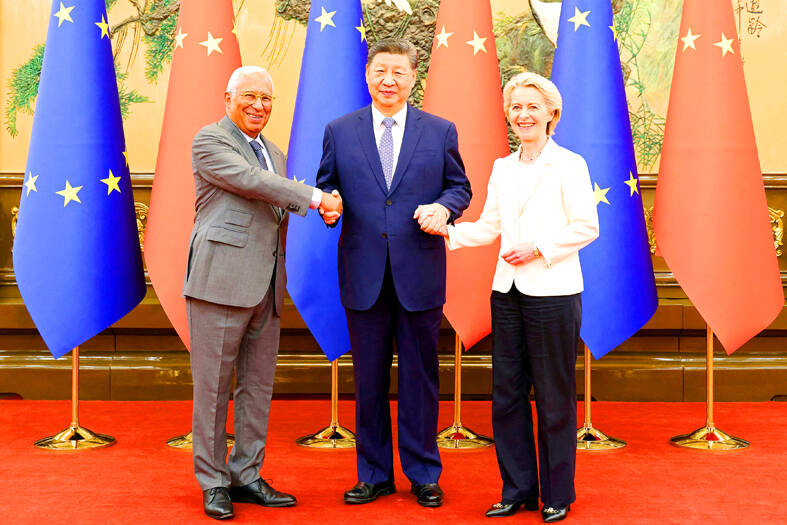Chinese President Xi Jinping (習近平) yesterday said that China and the EU must deepen trust in a turbulent world, but the bloc’s top officials called for “real solutions” to move past an inflection point as they met in Beijing.
China’s leadership has sought to draw the EU closer as it positions itself as a more reliable partner than the US, but the EU has made clear that there are deep divisions over trade, fears that cheap, subsidized Chinese goods could overwhelm European markets and Beijing’s tacit support for Russia’s war against Ukraine.
Although nominally intended to celebrate 50 years of diplomatic ties, the long list of grievances set the stage for a contentious summit.

Photo: Reuters
Welcoming EU Commission President Ursula von der Leyen and European Council President Antonio Costa at the Great Hall of the People, Xi said that “the more severe and complex the international situation is, the more important it is for China and the EU to strengthen communication, increase mutual trust and deepen cooperation.”
In the context of that turmoil, Chinese and European leaders must “make correct strategic choices that meet the expectations of the people and stand the test of history,” Xi said.
“The challenges facing Europe at present do not come from China,” he said. “There are no fundamental conflicts of interest or geopolitical contradictions between China and the EU.”
Von der Leyen said that “it is vital for China and Europe to acknowledge our respective concerns and come forward with real solutions.”
Ties had reached an “inflection point,” she said.
Costa said that the bloc wanted to see “concrete progress on issues related to trade and the economy, and we both want our relationship to be ... mutually beneficial.”
Brussels had acknowledged that the talks between its top officials, and Xi and Chinese Premier Li Qiang (李強) later yesterday would be tense.
“We know that we don’t see eye to eye with China on many issues, but we believe that it is essential to have this kind of very direct, and open and constructive conversation sitting at the table at the highest level,” a senior EU official told reporters last week.
Top of the agenda for the EU is the yawning trade deficit with China that stood at about US$360 billion last year and which Von der Leyen has described as “unsustainable.”
Beijing has dismissed those concerns, insisting that Brussels must “rebalance its mentality,” not its economic ties with China.
Brussels was to demand that China ease market access for European companies and loosen export controls on strategically crucial rare earths, Von der Leyen has said.
The EU has imposed hefty tariffs on electric vehicles imported from China, arguing that Beijing’s industrial subsidies unfairly undercut European competitors.
China has rebuffed that claim and announced what were widely seen as retaliatory probes into imported European pork, brandy and dairy products.
A second key source of friction is Russia’s war in Ukraine.
Brussels says that China’s deepening political and economic relations with Russia since the 2022 invasion represent tacit support for Moscow that have helped its economy weather sweeping Western sanctions.
In the meeting with Xi yesterday, Costa urged China to “use its influence” on Russia to help end Moscow’s “war of aggression.”

THE TRAGEDY OF PUNCH: Footage of the seven-month-old Japanese macaque has gone viral online after he was rejected by his mother and formed a bond with a soft toy A baby monkey in Japan has captured hearts around the world after videos of him being bullied by other monkeys and rejected by his mother went viral last week. Punch, a Japanese macaque, was born in July last year at Ichikawa City Zoo. He has drawn international attention after zookeepers gave him a stuffed orangutan toy after he was abandoned by his mother. Without maternal guidance to help him integrate, Punch has turned to the toy for comfort. He has been filmed multiple times being dragged and chased by older Japanese macaques inside the enclosure. Early clips showed him wandering alone with

Australian Prime Minister Anthony Albanese yesterday said he did not take his security for granted, after he was evacuated from his residence for several hours following a bomb threat sent to a Chinese dance group. Albanese was evacuated from his Canberra residence late on Tuesday following the threat, and returned a few hours later after nothing suspicious was found. The bomb scare was among several e-mails threatening Albanese sent to a representative of Shen Yun, a classical Chinese dance troupe banned in China that is due to perform in Australia this month, a spokesperson for the group said in a statement. The e-mail

South Korea would soon no longer be one of the few countries where Google Maps does not work properly, after its security-conscious government reversed a two-decade stance to approve the export of high-precision map data to overseas servers. The approval was made “on the condition that strict security requirements are met,” the South Korean Ministry of Land, Infrastructure and Transport said. Those conditions include blurring military and other sensitive security-related facilities, as well as restricting longitude and latitude coordinates for South Korean territory on products such as Google Maps and Google Earth, it said. The decision is expected to hurt Naver and Kakao

TENSIONS: The march went ahead without clashes, but arrests were still possible as police investigate suspects behind Nazi salutes, racist slurs and homophobic insults Thousands of people on Saturday marched in southeastern France under heavy security in tribute to a far-right activist whose killing, blamed on the hard left, has put the country on edge. The crowd — many wearing black and some covering their lower faces with masks — marched through the city of Lyon carrying flowers and placards bearing pictures of Quentin Deranque and the words: “justice for Quentin” and “the extreme left kills.” The 23-year-old died from head injuries following clashes between radical left and far-right supporters on the sidelines of a demonstration against a politician from the left-wing France Unbowed